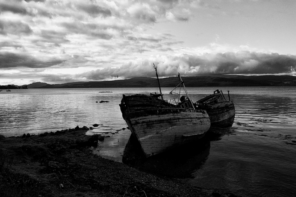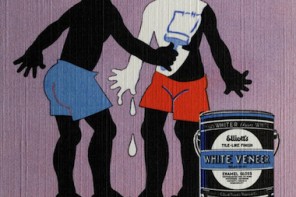Considering what happened in the coastal communities and the images of destruction you have no doubt seen on TV and in print, my situation can be viewed as a matter of minimal damage. As far as hurricanes go, I was somewhat fortunate: I still have a place to call ‘home’ that continues to hold pleasant reminders of pre-hurricane life. But even so, for what seems a rather long period of time, circumstances have changed; life has a different rhythm.
It was a little after 9 PM, on Monday, September 15, post-hurricane time when I starting handwriting this piece in the dim light offered by my small, but cherished, flashlight. Completing it would have to wait until I could reach my campus office and enjoy the often under-appreciated pleasure of electricity and a computer. But tonight, there is no electricity and no running water. Yet, I can sit comfortably looking out the window at the Houston downtown skyline and the flickering red and blue lights of police cars racing to catch those breaking the 9 PM Houston curfew. James Taylor sings softly in the background with as much clarity my small battery operated AM/FM radio can muster. In classic James Taylor form, he urges me to “shower the people you love with love.” I think many of them would actually settle at this moment for the ability to simply take a hot shower.
This is life, post-Hurricane Ike, in Houston, complete with its heightened sensitivity to both the large and small moments of our fragile existence. There is a great deal of time and little to occupy that time after dark — plenty of time to think and run through the countless “what if” scenarios.
I am a theologian by training, one interested in the felt consequences of theologizing, and so thoughts of the flood water running down city streets, the massive destruction of Galveston and other coastal towns, the terror on the faces of those seeking some relief, all push me to ask a question: If there is a God, where is God when such horrible things are happen? This is not simply a question generated by my own discomfort, or even the discomfort of my neighbors across the Gulf Coast. One need only think of the disasters that have occurred across the globe in recent months. Again, if there is a God, where is God when such horrible things happen? This question, typically labeled by theologians “the problem of evil” and explored using the rubric of theodicy (i.e., “what can one say about divine justice in light of human suffering in the world?”) comes natural to a theologian. But really, it is the sort of question asked on a much larger scale: Why…? Why this suffering caused by disasters such as 600-mile-wide Hurricane Ike?
There is good news and bad news on this front. The good news first: Whether couched in a statement of faith and belief, or framed as a ‘secular’ critique of religious commitment, in a country with “In God We Trust” stamped on our currency raising this question just seems a natural first response. That is to say, the problem of natural and moral evil phrased in terms of theodicy has a long history and numerous traditional expressions. Even asking the question, theologically venting so to speak, provides some relief. In fundamental ways the question implies the large and deep question of life, of human existence, of our ‘purpose’ and ‘meaning’ in the world. It can be a theological way of assessment, re-direction, and a starting point for “getting ourselves together.”
Now the bad news: Theodicy tends to be no more than what I have described above. It is theological ‘throat clearing.” It is an endless maze in that, according to scholars like Terrence Tilley, there is no way to provide a satisfactory response on the long term. Philosopher of Religion John Hick some years ago offered a study of various ways in which evil is addressed theologically, careful readers of that text — Evil and the God of Love — will note the holes in the various arguments, but will also appreciate the marked and desperate need to make sense of the unthinkable. For centuries Christian scholars and ministers have wrestled with the justice of God in light of human suffering; but ultimately their responses fall short. Few in the general public would accept the idea of a demonic god as the backbone of Christianity. Some are willing to reflect on this theological issue and suggest it is a matter of human will and human misconduct: We are destroying the environment and creating condition ripe for greater and greater storm activity, etc. Yet, this response, while giving humans a swift kick, still begs the question: Where is God in all this? Is there a God to talk about in light of this suffering? Even more acceptable for many is the idea of a limited God, a God who respects human free will and works in human affairs through persuasion rather than power to force certain developments and actions. However, when interrogated sufficiently, even this response leaves us thinking, if not speaking, questions: Of what real benefit is a limited God? If God cannot or will not do the “heavy lifting” necessary to move humanity along (often against our collective will it seems) what’s the point of speaking about God? What, then, does God do that we cannot do if we really try?
You get the point. Addressing evil through the theological framework of theodicy does not achieve much in the long run. Yet, like moral evil, the type of suffering generated by what we have called ‘natural disasters’ demands attention from those who consider themselves religious. These events require a response that shows in some way, shape, and form, the inner-workings of one’s commitments, either framed as a matter of religious conviction or moral orientation.
I suggest we turn to ethics — what ought I do? — to the grand tradition of figures such as African Methodist Episcopal Church bishop, Reverdy C. Ransom and Reverend Walter Rauschenbusch, theologian and seminary professor, who were major advocates for the “social gospel”: the idea and practice of religion as socially transformative through recognition that religious commitment must make a difference in the world. Now, that’s the stuff! Attention to the practice of our convictions (whether we actually label them ‘religious’ or simply refer to them as ‘moral’) must be the first order of business. Doing so helps us put our theological questions in perspective: Theology is a second order enterprise. That is to say, it follows our actions, and interprets and explains our experiences and actions.
Therefore, while it is a natural impulse to ask, the most important question is not where God is in all of this (whether raised as matter of faith or as critique from a posture of disbelief). Rather, the proper question is how can I act in such a way as to represent the best of my convictions (whether framed as the consequences of religion or whether more secular in origin)? Our theologizing Hurricane Ike and other disasters, again, is an understandable impulse, but it does not help folks rebuild and revive their lives. Ethics, on the other hand, can point us in the correct direction by providing strategies for activity on the ground, ways to engage with those suffering the aftermath of death-dealing events.
Photo by Adam Melancon via Flickr under a Creative Commons license: “Church in Esther/Mouton Cove After Hurricane Ike”




